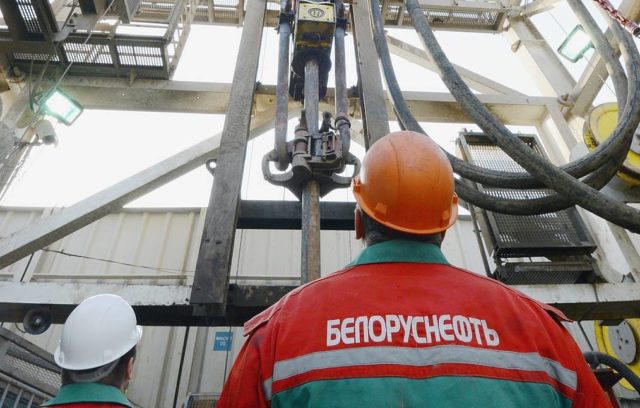
Belarus Struggles to Circumvent Western Sanctions Against Its Oil Industry
Publication: Eurasia Daily Monitor Volume: 18 Issue: 127
By:

On July 29, Belarusian President Alyaksandr Lukashenka appointed Mikhail Kostechko to serve as the new general director of the country’s main oil products trader, Belorusskaya Neftyanaya Kompaniya (BNK), and ordered him to maintain foreign market share regardless of the activity of the “Western scumbags” (President.gov.by, July 29). Undoubtedly, Lukashenka was referring to the sanctions recently imposed by the United States, European Union and the United Kingdom that had significantly affected Belarus’s oil sector (see EDM, June 30). The Belarusian side is experimenting with many different actions to try to mitigate the effects of these restrictive measures; however, it seems it will not be able to fully circumvent the international penalties. This is particularly the case because the Western sanctions continue to be expanded, as was illustrated on August 9, when the US, Canadian and UK governments imposed further sanctions packages on the one-year anniversary of the start of the Belarusian political crisis.
In general, Minsk’s attempted responses are currently aimed at both circumventing the Western sanctions against the Belarusian oil industry as well as making it more difficult for analysts to track the restrictive measures’ effects. First, the Belarusian authorities have removed open access to governmental customs data regarding oil products and potash exports (Interfax, July 13), and they likewise hid the statistics concerning the Naftan refinery’s production (the plant is under US sanctions) (Gorod214.by, July 29). Second, Belarus changed the shareholder structure of targeted companies (or their subsidiaries, due to the US Office of Foreign Assets Control’s “50 percent rule”) to limit their sanctions exposure. The starkest example of the latter tactic may have been the recent presidential order to withdraw Belarus’s international oil products trader BNK from Belneftekhim’s indirect control, as the latter had fallen under US sanctions in April of this year (Pravo.by, July 17). Third, the Belarusians are also founding brand new companies to replace previously operating entities. It took Mikalay Varabyey (one of the Lukashenka’s deputies, who controls the EU-designated oil products trader Novaya Neftyanaya Kompaniya, or NNK) only three days to establish a new company—OOO Nordstar—presumably to circumvent the sanctions’ effects (T.me/nexta_tv, July 25).
Moreover, it appears Minsk has also managed to informally secure continuous crude oil supplies to Naftan, despite the secondary sanctions looming over the companies involved. The basis for that inference is that the refinery has not been shut down since the revocation of the US sanctions suspension in April. By their technical nature, refining plants cannot be frequently stopped and restarted as these facilities need to maintain a specific minimum level of capacity utilization. But Belarus would not have been able to provide Naftan with enough crude based from indigenous sources—domestic petroleum production is small and is being exported to Germany. Therefore, even though official Russian customs data and Transneft exports schedules indicate a halt in supplies to Naftan (TASS, August 2), deliveries from Russia are most likely still being realized in some informal way (in contrast, non-Russian deliveries to Naftan would not be economically viable for Belarus and would be easily traceable). This presumed murky scheme involving Russian supplies might involve dedicated intermediaries, false certificates of origin, etc.
Although the Belarusian authorities evidently see the Western sectoral sanctions as a threat to the country’s oil industry, serious obstacles are likely to prevent a full mitigation of the associated economic risks. The largest concern for Minsk is probably the fact that the EU’s sectoral sanctions include a ban on any new contracts for the import or transfer of all Belarusian petroleum products (see EDM, June 30). That particular restriction will be especially difficult to circumvent, as the sanctions provisions clearly state that the ban relates both to fuels of Belarusian origin and to ones from third countries but that have been exported from Belarus (Eur-lex.europa.eu, June 24). Effectively, even if Belarusians try to sell their petroleum products as of different origin (e.g. Russian), they would have to do that via Russia or (much less probably) Ukraine. However, such a scheme should then be easy to spot for the EU countries’ intelligence services, and it could make those exports no longer profitable for the original Belarusian producers.
The second apprehension from Minsk’s point of view is that the Western countries and the EU itself are still further expanding their restrictive measures lists. Illustratively, yesterday, August 9—i.e., on the one-year anniversary of Belarus’s fraudulent presidential election, which sparked mass street protests and bloody crackdowns by the authorities—the US, Canada and the UK announced additional sanctions. The penalties include several new US designations aimed at persons linked to Lukashenka’s regime (Treasury.gov, August 9); while the British and Canadian measures bring those governments in line with the previously mentioned EU ban on importing or transferring Belarusian petroleum products (Gov.uk, Canada.ca, August 9). All of these new sanctions provisions/designations add to Belarus’s economic problems, further reducing its room for maneuver on the international stage.



